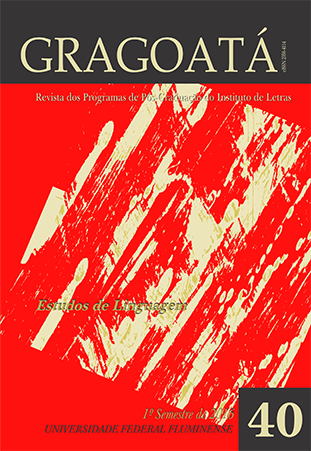THE CONSTRUCTION OF THE ‘ETHOS’ IN POPE FRANCIS’S SPEECHES
DOI:
https://doi.org/10.22409/gragoata.v21i40.33386Keywords:
discourse analysis, scenography, ethosAbstract
This study aims to investigate the construction of a new leadership in the Catholic Church in the light of the studies on ethos and scenography by Dominique Maingueneau (2008a, 2008b, 2008c, 2008d), the building of the image of itself in the speech. The research will focus on an infographic published on the newspaper Correio Braziliense, in the Pope's interview granted to Father Antonio Spadaro and published in Civiltà Cattolica magazine in September 2013, and in the Apostolic Exhortation Evangelii Gaudium - The Joy of Gospel, published in November 2013. This study seeks to demonstrate that Bergoglio works to buid an ethos of humility and self-denial that finds strength and legitimacy by contrast with the figure of emeritus pope Joseph Ratzinger, his anti-guarantor, representative of a set of values in which the current Catholic no longer recognizes leadership. The research also aims to illustrate why the reform promised by supervening of Bergoglio to the papacy hardly correspond to the big reform imagined by the young Catholic community in the world. It will be shown that the most significant change from the first two years of the new Pope is due to the tone of his speech, not real intent to change any aspects of the doctrine.
Downloads
Downloads
Published
How to Cite
Issue
Section
License
Authors who publish in Gragoatá agree to the following terms:
The authors retain the rights and give the journal the right to the first publication, simultaneously subject to a Creative Commons license CC-BY-NC 4.0, which allows sharing by third parties with due mention to the author and the first publication by Gragoatá.
Authors may enter into additional and separate contractual arrangements for the non-exclusive distribution of the published version of the work (for example, posting it in an institutional repository or publishing it in a book), with recognition of its initial publication in Gragoatá.

Gragoatá is licensed under a Creative Commons - Attribution-NonCommercial 4.0 International.











